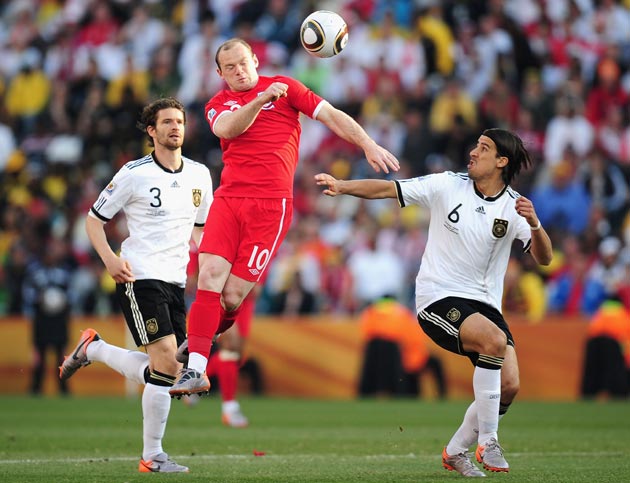Is it time for England to ditch the 4-4-2 and play like the rest of the world?

Terry Venables tells a story about Paul Gascoigne at Tottenham. Gazza, with his limited attention span, was forever bemoaning the time spent working on tactics. Then he went to Italy to play for Lazio. When Venables saw him next, Gascoigne had changed his tune, even admitting that, after confronting the deep and well-organised defences of Serie A, he realised how important tactics were.
Fabio Capello is under fire for playing 4-4-2 (the formation with which England won the World Cup an awfully long time ago) in Bloemfontein on Sunday. It is a simple system in which everyone knows their jobs; perfect, you might argue, for the tactically unsophisticated English. This is why most England managers end up using it.
The Italian is also perplexed by the criticism, arguing he played the same formation in qualifying and no one complained then. Not every observer agrees. It looked a lot like 4-2-3-1 in qualifying, with Frank Lampard sharing midfield anchor duties with Gareth Barry, and Wayne Rooney playing behind Emile Heskey. Against Germany, Lampard seemed to get forward more, and with Heskey on the bench, Rooney also pushed up. He had to, as Jermain Defoe does not hold the ball as well.
The problems with 4-4-2 are that better opponents can slip between its straight horizontal and vertical lines, and the midfield can be outnumbered. Most teams here have been playing a five-man midfield, as Germany did. A team playing two-up is a man short in midfield. Neither Chelsea, Manchester United nor Arsenal play 4-4-2. Nor do the Champions League finalists, Internazionale and Bayern Munich. All prefer a system which allows a five-man midfield when defending, and three-man attack when going forward.
The argument has also been made that a five-man midfield, with Gerrard pushing up when England attack, would put the best players in positions that suit their talents, positions they are used to at their clubs. If England did not have a world-class striker beyond Rooney, why play with two up front?
In winning Euro 2008, spain played 4-5-1, 4-4-1-1 and 4-4-2. They have a surfeit of top-quality midfielders but they also have two outstanding strikers, David Villa and Fernando Torres. When one of this pair is unavailable they play an extra midfielder. This has been the case under both Luis Aragones and Vicente del Bosque. For them the game is about finding a system which suits their players; but it works because the players are capable of playing different systems.
The formation Capello used on Sunday is not the problem, the problem is the players, and the fundamental structural weaknesses in the way the English game develops them.
It is a constant debate in coaching circles: is a game won or lost by the system used or the players? The usual conclusion: it is a bit of both. Bad players lose matches whatever the formation, but the right system can make the difference when teams are relatively even – as at the World Cup.
Blame the system?
*Including England, only nine sides of 32 at have consistently used a 4-4-2 formation at this World Cup: Algeria, Cameroon, Chile, England, Ghana, Serbia, Slovakia, Slovenia and the United States. The tournament's major powers are conspicuous by their absence.
*The most successful teams so far have varied used more 'modern' alternatives:
Brazil: 4-2-3-1 Dunga employs two holding players to allow the front four freedom to attack
Argentina: 4-3-2-1 Messi and Higuain slot in behind Tevez to create a three-pronged attack.
Spain: 4-3-1-2 Iniesta enjoys a troublesome free role behind Torres and Villa.
Germany: 4-2-3-1 Klose is a focal point; Podolski, Müller and Ozil push forward.
Join our commenting forum
Join thought-provoking conversations, follow other Independent readers and see their replies
Comments
Bookmark popover
Removed from bookmarks